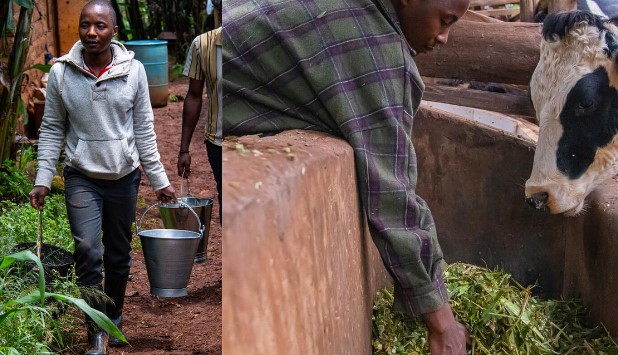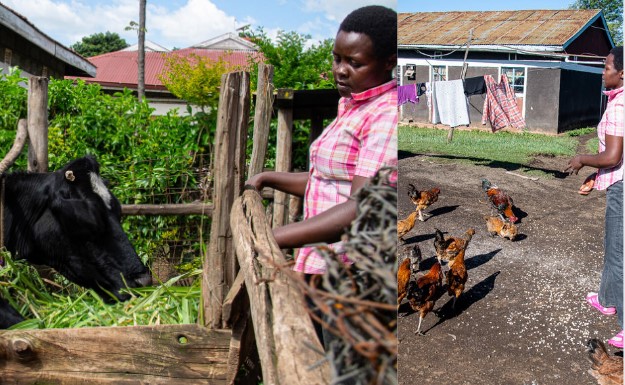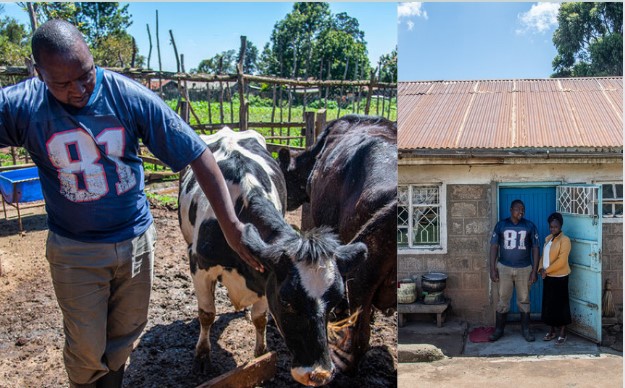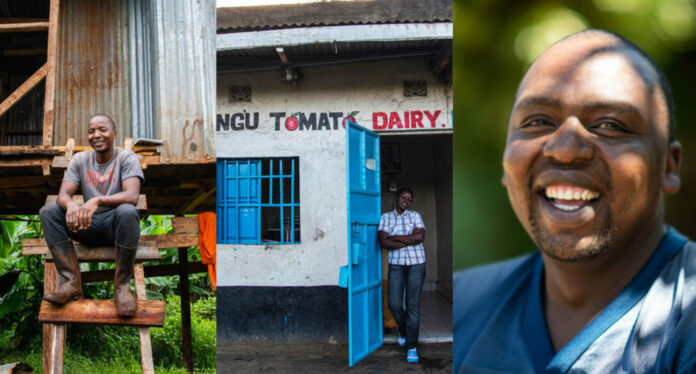The harsh reality is that young Kenyans face numerous challenges across the country. Young Kenyans have often been labelled lazy, loud, disorganized and, above all, inexperienced.
Contemporary tradition has it that, after parents invest heavily to educate their sons and daughters, they expect them to pursue jobs outside of agriculture.
These young Kenyans find themselves up against hierarchies and assumptions about what they should do with their careers.
To make amendments, the government along with several stakeholders has formulated better youth-friendly policies to create inclusive development and most importantly green growth for young people.
There is a large market opportunity in the dairy industry. Kenyans consume more milk than any other country in Africa.
According to an ILRI report, Kenya is set to become a net dairy exporter of dairy milk by 2030. With 70% of the Kenyan population being young people, where does the nexus meet the crisis?
A portion of young Kenyans have already decided to become dairy entrepreneurs. The business world is tough, especially when they lack support.
Resiliently, the youth venture into agribusiness for various reasons.
Some do it as a way of earning money after finishing school or as a stepping stone to bigger doors of opportunities such as dairy processing. Other times, it’s due to the lack of fulfilment from a white-collar job.
In this article, we take a look at 3 youths who have overcome adversities to become successful dairy farmers.
1. Samuel Ndung’u

When Samuel was in school and needed to purchase a laptop, he didn’t go to HELB or for a bank loan. Neither did he ask his parents for money. The Kiambu-based dairy farmer sold his first dairy cow.
Before starting his dairy enterprise, Samuel worked as a late-night sales assistant in Kiambu, putting in a minimum of 14 hours into the shift. With a salary of Sh. 7,500 monthly, Samuel took a serious career rethink.
Today, he lives on his family farm running his successful dairy business. He earns money from selling milk to nearby cooperatives making profits of up to Sh. 29,000 ($200).
Samuel averages 35 litres of milk sold on a single day. While more than ½ of Kenyan youths struggle to look for jobs, Samuel wakes up to sell milk and make milky sweet tea for his family.
“Imagine how many people in this country drink milky tea every morning and every afternoon. All those people need milk. That is a lot of milk,” Samuel says with a grin on his face, explaining now he makes more money than ever before.
“For young people like me who start out with nothing, that is a great opportunity.”
Additionally, he rears chickens which provide him with eggs for subsistence use. At the urban setting farm, Samuel has fitted a biodigester in the garden.
He bought it with money he made from selling two cows namely ‘Gas’ and ‘Cooker’. Bacteria break down waste from his cows and the biodigester converts it into renewable energy.
“Some people say you stink after doing this work. This heats up my water for bathing, so I don’t mind,” he said.
He recalled how his family was initially hesitant to provide the moral and financial support to set up the digester.
“Sometimes people fear change. They wondered if this would add up. Now everybody enjoys going into the house, lighting a match and having a fire to make tea and cook with.”
2. Lilian Satia

Lilian Satia is a wife and mother of 3 from Nakuru County. She runs a milk bar in Nakuru County along with 9 other youths. This initiative was supported by the International Fund for Agricultural Development.
“We came up with the idea of a milk bar. We started delivering our own milk; then the demand began to rise. The milk bar has been a way to keep control of our income. I know when customers pay and how much,” she says.
As a woman, Lilian has found herself working in a conceptually male-dominated field. Acknowledging that she is going against cultural norms as a woman and a young person, the ‘milk entrepreneur’ has set out to prove the world wrong.
Most women are not allowed to own cows or make decisions about the income their household cows generate. While some consider farming ‘dirty work’, Lilian took the bull by its horns.
She is now earning a substantial income from her hustle instead of laying idle in unemployment and waiting for the men to provide money.
“Women do suffer a lot. All the work belongs to women here. But the money belongs to men,” Lilian says.
“Women are the pillars of the household. It’s hard work,” confirms Serah Ng’anga, Lilian’s mother-in-law.
Young people such as Lilian and Samuel require the right support from responsible stakeholders to thrive in their ventures.
“I’d like to see more youth involved in agriculture and become more successful. This will take a lot of support from our government and a lot of initiative from our youth,” said Lydia Kimachas, an employee from the Ministry of Agriculture.
3. John Ngasha

41-year-old John Ngasha is a dairy entrepreneur from Nakuru County. John worked in construction sites, but he also filled his pockets from the dairy business.
John started like any other curious person who wanted to become a farmer. He keyed in his search terms on Google and started reading.
“I use Google to get knowledge,” he said explaining how he was able to navigate a sea of information to start his small dairy farm.
John Ngasha revealed that he started off by buying two bulls. He later sold the bulls and purchased 3 dairy cows so he could sell milk.
“I started with this little. Sometimes I had no money at all. My family likes to drink milky tea. Ashamed that I had no money to buy milk, I decided to start keeping cows to have milk and to earn some money,” he noted.
John adds that his greatest challenge is the lack of land. Even though he keeps dairy animals, he cannot grow feed on it since he borrows the land from his aunt who emigrated.








